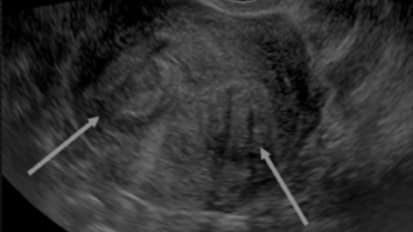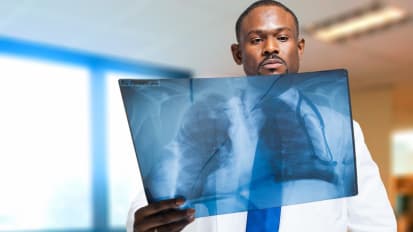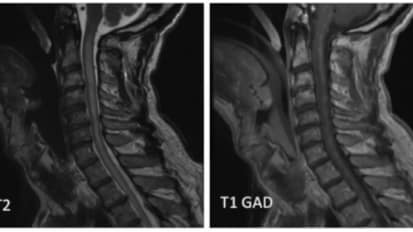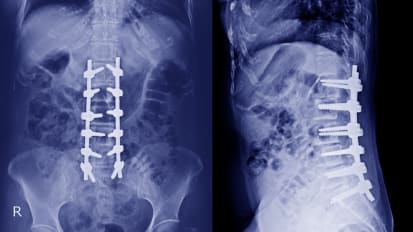Search
 Video
Video
Evaluation & Common Presentation of Fibroids
Dr. Jeannette Lager examines the presentation of fibroids in ultrasound, MRI and CT imaging. Video
Video
Unconscious Bias in Patient Care: Harms and Paths to Healing
While physicians intend to treat all their patients with equal respect and compassion, studies show that favoritism and other implicit attitudes can emerge, especially in times of stress, affecting medical decisions and care quality. Video
Video
Long COVID: A New Way to Look at a Growing Problem
Synthesizing multiple studies, pulmonologist Brian Block, MD, reveals which patients are at risk for lasting symptoms from infection with the coronavirus (it’s not who you might think). Video
Video
Lung Cancer Screening: Who, How and When to Refer
†horacic radiologist Brett M. Elicker, MD, and thoracic surgeon Johannes Kratz, MD, present about current lung cancer screening guidelines: who, how, and when to refer. Video
Video
Placenta Accreta Spectrum Disorder: Proven Strategies from a Multidisciplinary Team
Placenta accreta spectrum disorder is a varied and increasingly common complication of pregnancy, so ob/gyns need a firm grasp of risk factors and ultrasound signs. Video
Video
Screening Guidelines for Common Cancers: A Lifesaving Update
In just 35 minutes, hematologist-oncologist Akshiv Malhotra, MD, presents the current recommendations on cervical, breast, colon and lung cancers, breaking down the test options for each and when to start tests based on a patient’s risk. Video
Video
Aggressive Versus Conservative Approaches to Knee and Shoulder Injuries
When is surgery the best choice? And which surgery will have the best outcome? Conventional wisdom has shifted in many cases. Learn which factors to weigh in determining whether to recommend surgery, injections, PT or other types of conservative management. Video
Video
Asthma Update: 2020 Treatment Guidelines Plus COVID-Appropriate Strategies
Allergist and immunologist Monica Tang, MD, presents the latest on this common condition, from key diagnostic factors and therapeutic choices to which patients should be seen in person during the pandemic. She also gives a glimpse of asthma preventives on the horizon. Video
Video
Chronic Pelvic Pain and Endometriosis: Part 2
Jeannette Lager, MD, describes a directed pelvic examination for chronic pelvic pain, including a general pelvic exam, Q-Tip test for vulvodynia, abdominal exam (including testing for Carnett’s Sign), an exam of the pelvic floor muscles and an assessment of myofascial trigger points. Video
Video
A Fresh Look at Lipids: Atherosclerosis Prevention in 2023
Cardiologist Clifton Watt, MD, presents an update on lipoproteins, including how genetic factors can impact test results and whether pre-measurement fasting actually matters. Video
Video
UCSF Cancer Grand Round Series: 2024 Best of the Year
UCSF Health and John Muir Health specialists in treatments for numerous cancers – including breast, lung, bladder and colon cancer – unpack last year's influential trials, several of which established new standards of care for specific patient populations. Video
Video
Pass the Smell Test: How to Assess Olfactory Loss Linked to COVID and Other Conditions
Otolaryngologist Patricia A. Loftus, MD, discusses what’s known about smell loss in COVID patients as well as its general prevalence in our aging population. Video
Video
Getting Ahead of Anal Cancer: Assess Risk and Screen Appropriately to Prevent Advanced Disease
“Don’t assume it's just a hemorrhoid,” says infectious disease specialist Cristina Brickman, MD, MSCE, in her talk on protecting high-risk patients from anal and perianal cancer Video
Video
Pregnancy Complications and Stroke Risk
Vineeta Singh, MD discusses the pregnancy- and post-pregnancy-associated risk factors for stroke and the management of these conditions. Video
Video
Multiple Sclerosis and Other Inflammatory Disorders of the Central Nervous System
Learn the latest thinking on MS and the genetic and environmental causes, preventing nerve loss in the brain and elsewhere, the role of vitamin D and UV exposure, breakthroughs on the horizon, and other inflammatory diseases like sarcoidosis. Video
Video
Focused Cancer Updates: Neoadjuvant Therapy for Breast Cancer and Managing Immunotherapy Toxicity
An expert panel delivers news to inform therapy and monitoring decisions, including a look at how the I-SPY 2 trial is accelerating evaluation of promising agents in high-risk breast cancer. Video
Video
Minimally Invasive TLIF; Techniques and Outcomes
Aaron J. Clark, MD, PhD, describes the minimally invasive approaches of transforaminal lumbar interbody fusion (TLIF) and its advantages over open TLIF surgery including the benefits for the obese and elderly, fewer complications and less pain. Video
Video
Constipation Frustration: How to Determine Therapy for a Diverse Diagnosis
A common disorder with a heavy socioeconomic burden, constipation has numerous causes and is described differently by different patients. Video
Video
Healthcare Reform Spine Surgery: Decision Making Stakeholders Perspectives and Moral Hazard
In this lecture Sigurd Berven, MD, discusses the decision making in complex spinal surgery and how to make informed decisions for the patients, to help them receive the outcomes they are expecting. Video
Video
Lumbar Fusion: Strategies to Lower Complications and Optimize Corrections
Focusing particularly on the needs of obese patients, neurosurgeon Aaron Clark, MD, PhD, discusses anterior and lateral approaches to lumbar interbody fusion. Video
Video
Managing PCOS with a Comprehensive Care Plan
Heather Gibson Huddleston, MD, details the comprehensive care plan for polycystic ovary syndrome (PCOS) used at the UCSF Center for Reproductive Health. Video
Video
Uterine Fibroids Conclusions
Dr. Jeannette Lager concludes her presentation on uterine fibroids by recapping the types and classifications, common presentations and medical treatment options. Video
Video
Care of Geriatric Patients in the Time of COVID-19
UCSF geriatrician and pulmonologist Leah Witt, MD, discusses how to identify high-risk senior patients, the most common course of the disease, useful monitoring methods and important follow-up on hospitalized patients after discharge. Video
Video
A Guide to GERD: Managing Symptoms and Complications of a Common Condition
With gastroesophageal reflux disease affecting 40% of the U.S. population every month, primary care providers need a straightforward plan for initiating therapy, as well as an up-to-date understanding of causes and treatment complications.


